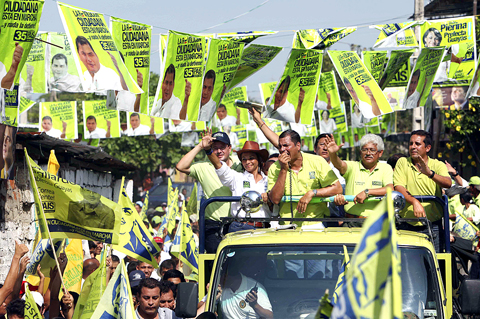Ecuadoran President Rafael Correa’s radical transformation of his historically unstable nation, including a new Constitution that would grant him greater powers, is expected to propel the leftist economist to easy re-election tomorrow.
The 46-year-old Correa, who blames the global economic crisis on capitalism’s “structural flaws,” has spooked foreign investors with a moratorium on debt payments and tough dealings with oil companies and other multinationals.
He has imposed some of the world’s strictest protectionist measures to shield local industries, leading to criticism that his huge social spending agenda could bust the Treasury as recession takes hold this year.

PHOTO: AP
But it is precisely such actions that have made Correa, a little-known economy minister just four years ago, so popular.
“Let’s bury the party-docracy,” he told supporters on Thursday night as campaigning ended, his buzzword for the corrupt traditional politics that he has long eschewed.
Since taking office in January 2007, Correa has tripled state spending on education and health care, doubled to US$30 a monthly payment for single mothers and launched subsidy programs for small farmers and people building their own homes.
Pre-election polls show Correa more than 20 percentage points ahead of his closest rival, former president and coup leader Lucio Gutierrez. Banana magnate Alvaro Noboa was running a distant third.
To win without forcing a runoff, Correa needs more than 50 percent of the vote or at least 40 percent with a 10-point margin over his closest competitor.
Under the country’s new Constitution, approved by 64 percent of voters in a September referendum, Correa would be eligible to run for a second consecutive four-year term in 2013. His current four-year term was automatically truncated by the new Constitution.
Voters tomorrow will also choose mayors, governors and a new 124-seat National Assembly. The new constitution also lowers the voting age to 16 and for the first time permits soldiers, police and prison inmates to vote.
Correa’s critics acknowledge his popularity but warn that like his ally, Venezuelan President Hugo Chavez, he benefited politically from oil prices that skyrocketed last year but have since come down to earth.
Ecuador’s oil-based economy grew 6.5 percent last year the government says, but petroleum revenues have dropped 67 percent in the first quarter of this year.
Correa’s governing model “has been successful in its redistribution of wealth and for directing resources to social programs but not so successful in creating new types of productivity,” said Vladimir Sierra, head of the sociology department at Quito’s Catholic University.

Kehinde Sanni spends his days smoothing out dents and repainting scratched bumpers in a modest autobody shop in Lagos. He has never left Nigeria, yet he speaks glowingly of Burkina Faso military leader Ibrahim Traore. “Nigeria needs someone like Ibrahim Traore of Burkina Faso. He is doing well for his country,” Sanni said. His admiration is shaped by a steady stream of viral videos, memes and social media posts — many misleading or outright false — portraying Traore as a fearless reformer who defied Western powers and reclaimed his country’s dignity. The Burkinabe strongman swept into power following a coup in September 2022

‘FRAGMENTING’: British politics have for a long time been dominated by the Labor Party and the Tories, but polls suggest that Reform now poses a significant challenge Hard-right upstarts Reform UK snatched a parliamentary seat from British Prime Minister Keir Starmer’s Labor Party yesterday in local elections that dealt a blow to the UK’s two establishment parties. Reform, led by anti-immigrant firebrand Nigel Farage, won the by-election in Runcorn and Helsby in northwest England by just six votes, as it picked up gains in other localities, including one mayoralty. The group’s strong showing continues momentum it built up at last year’s general election and appears to confirm a trend that the UK is entering an era of multi-party politics. “For the movement, for the party it’s a very, very big

ENTERTAINMENT: Rio officials have a history of organizing massive concerts on Copacabana Beach, with Madonna’s show drawing about 1.6 million fans last year Lady Gaga on Saturday night gave a free concert in front of 2 million fans who poured onto Copacabana Beach in Rio de Janeiro for the biggest show of her career. “Tonight, we’re making history... Thank you for making history with me,” Lady Gaga told a screaming crowd. The Mother Monster, as she is known, started the show at about 10:10pm local time with her 2011 song Bloody Mary. Cries of joy rose from the tightly packed fans who sang and danced shoulder-to-shoulder on the vast stretch of sand. Concert organizers said 2.1 million people attended the show. Lady Gaga

SUPPORT: The Australian prime minister promised to back Kyiv against Russia’s invasion, saying: ‘That’s my government’s position. It was yesterday. It still is’ Left-leaning Australian Prime Minister Anthony Albanese yesterday basked in his landslide election win, promising a “disciplined, orderly” government to confront cost-of-living pain and tariff turmoil. People clapped as the 62-year-old and his fiancee, Jodie Haydon, who visited his old inner Sydney haunt, Cafe Italia, surrounded by a crowd of jostling photographers and journalists. Albanese’s Labor Party is on course to win at least 83 seats in the 150-member parliament, partial results showed. Opposition leader Peter Dutton’s conservative Liberal-National coalition had just 38 seats, and other parties 12. Another 17 seats were still in doubt. “We will be a disciplined, orderly